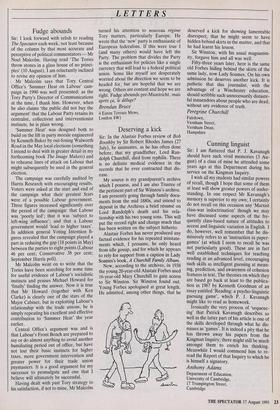Cunning linguist
Sir: I am flattered that P. J. Kavanagh should have such vivid memories (3 Au- gust) of a class of mine he attended some years ago at this Department during his service on the Kingman Inquiry. I wish all my students had similar powers of recall, though I hope that some of them at least will show greater powers of under- standing. In one respect Mr Kavanagh's memory is superior to my own; I certainly do not recall on this occasion any 'Marxist class-war indoctrination' though we may have discussed some aspects of the fre- quently class-based nature of attitudes to accent and linguistic variation in English. I do, however, well remember that he dis- missively refers to as 'instruction in paper- games' (at which I seem to recall he was not particularly good). These are in fact well established techniques for teaching reading at an advanced level, encouraging such skills as intelligent guessing at mean- ing, prediction, and awareness of cohesion features in text. The theories on which they are based go back at least to the publica- tion in 1967 by Kenneth Goodman of an essay entitled 'Reading: a psycho-linguistic guessing game', which P. J. Kavanagh might like to read as homework.
Ironically the very process of 'sequenc- ing' that Patrick Kavanagh describes so well in the latter part of his article is one of the skills developed through what he dis- misses as 'games'. It is indeed a pity that he has thrown away his papers from the Kingman Inquiry; there might still be much amongst them to enrich his thinking. Meanwhile I would commend him to re- read the Report of that Inquiry to which he is himself a signatory.
Anthony Adams
Department of Education, University of Cambridge, 17 Trumpington Street, Cambridge


















































 Previous page
Previous page